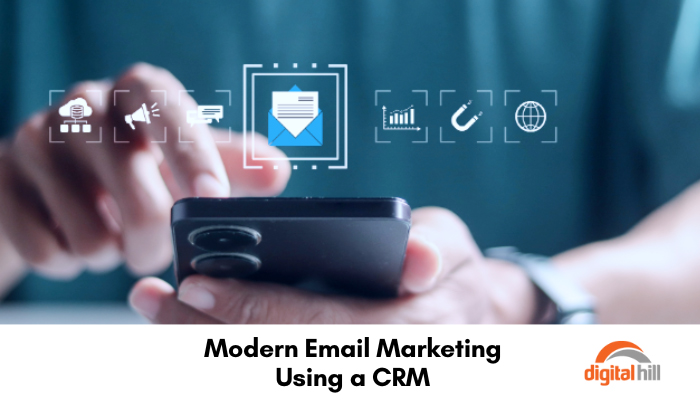Modern Email Marketing Using a CRM

As a business, relationships with your clients or consumers are important. After all, people love to support a business they feel connected to and trust. Building these relationships takes time, and they require careful nurturing to support. Using email marketing is a great way to connect, reconnect, and communicate with your clients. In fact, over 80% of small and medium businesses still rely on email as their main sales funnel. However, for email marketing to be effective, the right message has to go to the right person at the right time. Utilizing a CRM can help you do this by taking your email marketing into the modern era.
First, what is a CRM?
A CRM or Customer Relationship Management is software that helps businesses manage relationships with their customers through tracking. The software records how the client signed up, what emails they’ve opened, what links they’ve clicked, and any preferences they may have. Modern CRMs empower businesses to track their sales pipeline without relying on memory. Furthermore, they serve as a data hub, allowing businesses to better understand their target audience.
How a CRM Improves Email Marketing
Sending the right email to the right person is the biggest hurdle of email marketing. After all, if it is the wrong headline, the client may not even open it. Using a CRM allows you to better customize your emails and define your targeting to meet specific client needs. Other benefits include:
Centralized Data
Having a centralized hub for client data saves your business time while helping improve sales. Knowing what clients currently buy allows you to target them with new related or similar products easily. It also stops you from sending irrelevant emails, which improves your open and subscribe ratings.
Tracks Activity
The CRM lets you see what stage each person is at in the sales pipeline. This allows your business to send properly targeted emails to prospects, first-time clients, and returning clients. You can also quickly see what emails each client opens, how long they spent with the email open, and any actions they took from that email.
Segments Your Audience
Different clients are interested in different products and have different purchasing habits. Being able to easily segment your audience using purchase data and activity allows your business to better target each client. Simply assign a tag to clients using a certain product, then select that tag to send an email to every client who has previously purchased with a single click! You can also use segmentation to quickly find clients who have abandoned their cart or changed their minds about a purchase and send them a discount to incentivize the purchase.
Makes Nurturing Easy
Once you know what your clients are interested in, you can pitch them the right products. This allows you to build a better relationship with the client as you avoid sending unnecessary emails.
Automation
Businesses can set up email workflows to send automatically when a client completes an action. This could be as simple as a welcome email for new prospects or a thank you email to new clients. By setting up these automation workflows, you will never miss a touchpoint with your clients.
Analytics
As with any marketing campaign, tracking how emails are performing is crucial. Use the CRM analytics to review what emails are working and what needs to change. This is especially important if you are seeing high open rates and low click-throughs or vice versa.
Manually building an email relationship with just one client can be time-consuming and stressful, let alone tens or hundreds. Using a CRM allows your business to connect authentically with clients while ensuring no missed touchpoints so you can build that relationship successfully.
